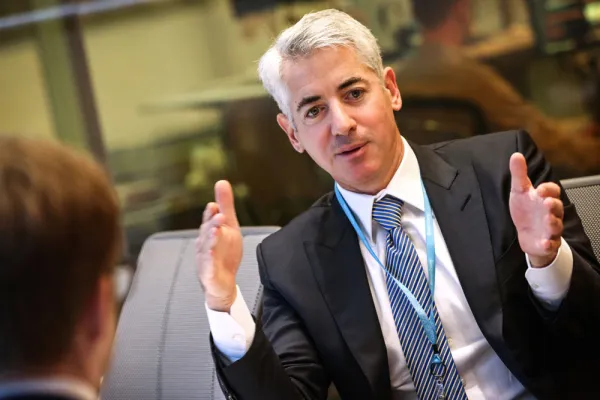Since the collapse of the Bretton Woods system and the oil shocks of the 1970s, international economic considerations have assumed an increasingly critical role in U.S. foreign policy.
By Deepak Gopinath
April 2001
Institutional Investor Magazine
Since the collapse of the Bretton Woods system and the oil shocks of the 1970s, international economic considerations have assumed an increasingly critical role in U.S. foreign policy. The advent of globalization and a growing sense of economic interdependence have only accelerated that process, which reached its peak during the Clinton administration. Treasury secretary Robert Rubin and his deputy, then successor, Lawrence Summers, ruled like viceroys, calling the shots for U.S. policy - and other countries' policies as well. Working closely with multilateral institutions like the International Monetary Fund and the World Bank, they encouraged developing countries to embrace free trade, liberalize capital markets and integrate into the global financial system - goals of the so-called Washington consensus that were first laid out during the preceding Bush administration.
Rubin and Summers championed a pragmatic - and activist - approach to intervention in emerging-markets crises, arguing that a financial meltdown anywhere in the world could, in certain cases, quickly threaten the U.S. and the global economy. They orchestrated the bailout of Mexico and pushed the IMF-led rescues of Asia, Brazil and Russia during the global financial crisis of 1997-'98. And they did not hesitate to give policy advice - publicly - to U.S. allies like Japan. The State Department, under Madeleine Albright, was left to chafe at its unaccustomed - and at times marginalized - role.
The new Bush administration remains untried so far in foreign policy matters, but one thing is sure: The State Department won't take a backseat to Treasury any longer - at least not when it comes to setting policy for countries in distress, if they are deemed to hold a national security interest for the U.S. Ironically, this turn of events is likely to lead to a continuation of Clinton-era policies of intervention and bailouts.
Why? The Bush administration's domestic interests are focused on economic initiatives, particularly the president's $1.6 trillion tax cut plan; beyond U.S. shores, it seems preoccupied with security and political concerns. The foreign policy team, led by political heavyweights like Secretary of State Colin Powell and Defense chief Donald Rumsfeld, stands in stark contrast to an economic team - still incomplete 90 days into the term - that has little international experience and has managed to stub its toe several times. In February Treasury Secretary and former Alcoa CEO Paul O'Neill inadvertently signaled the markets in a German newspaper interview that the U.S. no longer supports a strong dollar, causing an immediate swoon. O'Neill later sent bond prices down after criticizing the Treasury's bond buyback program.
O'Neill, his deputy, Kenneth Dam, and his nominee for international affairs, John Taylor, show little inclination toward Rubin's interventionist approach. All have been critical of IMF-led bailouts, arguing that these foster the moral hazard that causes market instability. They are less ideologically committed to the multilateral institutions that underpin the liberal economic order. "If you have a foolish fiscal policy and now you know you won't get help, then it will force you to take care of the problem," sums up Gerald O'Driscoll, international economy analyst at the conservative Heritage Foundation.
Powell, Rumsfeld and Vice President Dick Cheney are foreign policy realists, more concerned with how a financial crisis might affect their security objectives than with the theoretical risk that market intervention could create moral hazard. That leads some observers to conclude that the administration will react to future financial crises pragmatically, with the foreign policy team overriding a hands-off position where geopolitical concerns are paramount.
"In the next crisis, State will play a bigger role than they did in the last administration," says Robert Litan, director of economic studies at the Brookings Institution. "State will advocate stability. Powell is the 800-pound gorilla."
The new administration faced its first test not long into the new year, when political infighting and a weakened banking system sent Turkey into an economic nosedive. So much for the kind of benign neglect that might have been expected had the team at Treasury stuck to its ideological guns.
Rather than blame the IMF or abandon Turkey to the cruel logic of the markets, O'Neill moved to calm investors and support continued IMF aid, even as President George W. Bush called Prime Minister Blent Ecevit to express his approval of Turkey's decision to float its currency. "Over the last year Turkey's economic reform program, supported by the IMF, has successfully achieved many of its important goals on both the macroeconomic and structural fronts," said O'Neill the day Turkey abandoned its currency peg. Instead of raising the Clinton-era specter of financial contagion to justify support, O'Neill rationalized U.S. backing of Turkey on political and national security terms. "Turkey is an important ally and good friend of the United States," he asserted. Indeed. That day U.S. fighter jets operating out of Turkey bombed targets in Iraq.
To be sure, Turkey may not be a true test of administration economic policy. The support program is a carryover from the Clinton era. Turkey needed less financial assistance once it devalued, and its strategic importance was never at issue. But as one policy expert close to the Powell inner circle says, "We're not going to have Treasury calling the shots in places like Turkey."
This change in approach is occurring under the rubric of integration, and the new organizational structure of the Bush White House reflects its desire to more closely tie international economics into national security policy. "There is an assumption underlying critiques of the Clinton administration that somehow the economic people were running roughshod over the security people," says the Brookings Institution's Ivo Daalder, an expert on the National Security Council. "It is the explicit purpose of Bush to integrate international economics and security."
The first victim of this change has been the National Economic Council, formed by Clinton to work with the NSC to chart U.S. economic and security policy. The two councils shared international economic staffers, forcing cooperation. The NEC called meetings to discuss international economic issues.
In contrast, Bush has created the post of international economic adviser, now held by former trade lawyer Gary Edson, who reports to both National Security Adviser Condoleezza Rice and Chief Economic Adviser Lawrence Lindsey. In effect, Bush has dissolved the NEC, returning to a structure last used in the Nixon administration. There is no longer a way to call an NEC meeting. Instead, the NSC will meet to discuss international economic issues in sessions led by Edson or Lindsey. "Edson will be the person who does international economics on the NSC staff," says Daalder.
This relative strengthening of the NSC means that inside the White House economic considerations could take a backseat to security deliberations. It could also mean that key international economic decisions will lead to turf fights among Bush's Cabinet members.
"We live in a world where the distinction between economics and politics has dissolved. There are disturbing signs that [the Bush administration] doesn't get it," says Daalder. "They misunderstood the role of the NEC in the Clinton administration and emasculated it, and the outlook of the foreign policy team is highly traditional, state-centric and military-focused. There is no room for economic considerations."
How much these changes represent turf rather than policy issues remains to be seen. Financiers consider the difference between the Bush and Clinton administrations on international economics to be more of style and approach than of substance. "Given the uncertainty of the U.S. economic outlook combined with fragility in Japan and uncertainty in the Middle East, it should be clear that any difficulty in emerging markets would be interpreted, as in the 1990s, as a threat to the U.S. economy and ultimately U.S. national security," says Robert Dugger, a global fund manager and co-chairman of the Japan policy steering committee of the American Enterprise Institute.
"We may get the same policy but for different reasons," adds Desmond Lachman, an emerging-markets economist at Salomon Smith Barney. "In large cases that have geopolitical significance, security concerns will dominate economic considerations. In peripheral cases, we'll see more market-based approaches."
The administration's next trial may be Argentina, which in December received a $40 billion bailout package led by the IMF. Argentina matters to the markets, but it is far less important strategically than Turkey. The country is in turmoil as its economy stagnates and pressure builds to abandon its peg to the dollar.
Rethinking the pro-financial globalization policy promoted by Clinton may be welcome. Washington's insistence on capital convertibility and open capital markets set the stage for the Asian financial crisis. Rubin has admitted that Wall Street investors, some of whom rushed into newly opened markets without enough due diligence, deserved much of the blame for recent crises.
But a national-security-focused international economic policy carries risks of its own. Already, there are concerns on Wall Street that the Bush administration may be ill prepared to handle financial crises. And if realpolitik rules, crisis-hit countries more important to global markets than to U.S. foreign policy may be left without financial assistance.
"It is important that [the administration] is aware of the importance of hearing messages from Wall Street, the global financial markets and the business community," says Charles Dallara, managing director of the Institute of International Finance.





